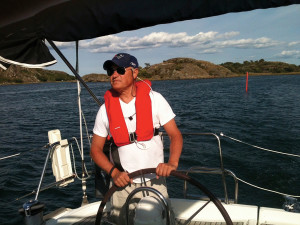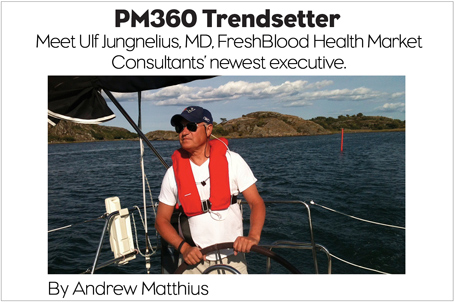Ulf Jungnelius, MD, has spent more than 25 years on the front-line of oncology drug development as he helped in the development of several successful oncology drugs, including Abraxane, Gemzar, Alimta and Revlimid. Now he is joining FreshBlood Health Market Consultants so he can share his experience and help others in their quests to develop new oncology treatments. PM360 spoke with Dr. Jungnelius about why this is such an exciting time for oncology R&D and how outcomes-based healthcare is changing drug development.
 PM360: With progress being made with PD1s, 4-1BBs, etc., what do you believe is the most exciting opportunity in immuno-oncology R&D?
PM360: With progress being made with PD1s, 4-1BBs, etc., what do you believe is the most exciting opportunity in immuno-oncology R&D?
Dr. Ulf Jungnelius: We’ve been doing immuno-oncology for more than 30 years, and basically it’s been a major failure to find something that works. With the new knowledge of the importance of checkpoint inhibition and identification of these receptors, we have come a long way toward truly interacting with the immune system to un-camouflage the cancer.
People have started to understand that you don’t change one variable in the immune system and then cancer is cured. It’s not that easy—the immune system is exceedingly complicated. It’s been around for more than three billion years, or almost as long as there has been life on earth. Today, we understand that there are some key places that are crucial for the immune system to function (i.e., the checkpoints), and here is one key target where we can go in and interfere. That opens many new doors for future development.
The next step would be starting to explore additional checkpoints and to see if we can combine immuno-oncology drugs, keeping in mind that we must be very careful in our approach not to initiate an immune storm. That has happened before, with very drastic negative effects on patients. That said, we are in a very exciting period because we just opened the door slightly ajar, and now is the time to see what else we can find to help us win the war against cancer.
Let’s assume somebody finds a promising target. What would be their next step?
The key is focus. A small company cannot afford to be all over the place. They need to focus on one program and, when they get into the clinic, one initial indication to demonstrate proof of efficacy. Then stay true to that indication and avoid starting a lot of additional studies that will be either understaffed or under-resourced. They need to be on top of their data and be laser sharp.
Has the change to an outcomes-based healthcare system and the reliance on oncology pathways changed the development of oncology treatments?
Yes, because if you find that biomarker or mutation, it basically allows you to select patients upfront who have a high potential of responding to your drug. That has a major impact on the company’s ability to be successful in getting the drug to market and getting a premium price that payers are willing to pay for it.
The challenge, however, is that very few efficacious biomarkers are out there. Most of the biomarkers are prognostic. So when you look at it, you know that this patient has a severe tumor, but it doesn’t tell you how the patient will respond to the treatment.
This is the new paradigm: We are now intensely looking for new biomarkers that correlate with treatment outcome efficacy. And that has a major implication on the way you commercialize drugs—you need to have a validated commercially available kit or device to check for these biomarkers. This is an entirely new industry—biomarker device companies. Of course, those kits require clinical trials as well.
So does that require pharma companies to partner with medical device or diagnostics companies to develop these kits?
We have a problem when it comes to developing these biomarkers for pharmaceutical companies. When we tried to develop one for CTLA4, we found that even though we had all this expertise in developing drugs, we had very little expertise in developing a biomarker.
Currently, the industries are not in sync with each other, but that day will come. As more biomarkers are detected, big companies such as Roche Diagnostics are stepping up. However, it’s still not clear how smaller companies will handle this. In other words, the worst-case scenario is that you have a fantastic drug, you know the biomarker, but you can’t get the biomarker test developed, validated and commercialized, so you can’t get your drug approved for the target patient population.
That would be unfortunate and leads to my next question. What is the best lesson you learned regarding new drug development obstacles?
What I learned: It is not so much about the asset you’re working on, but the people. You not only need to be a good drug developer, but also a good people manager. When people come in to work, are you going to sit there and micromanage them? No, you have to find a way of empowering people so that the collective brainpower is what will take the compound forward.
Do you have any advice for how to be a good manager?
One tactic is to pair people together. For example, you take a physician who you don’t expect to be the most detailed person and then pair him/her with a clinical research scientist who is very good at numbers and highly detailed. You may end up getting very good energy and synergy between them.
What do you consider to be your greatest accomplishment?
My biggest accomplishment is keeping a team together in both success and failure. Drugs don’t always work in the end, but I usually tell people that we’ve done what we could—now it’s up to the drug. And if the drug doesn’t perform as we hoped, it’s not the team’s fault. In the end, if the drug is not good enough, it’s not worth spending more money on.
What do you hope to achieve in your new role at FreshBlood?
The key with FreshBlood: The company has a lot of accumulated experience between all of our various colleagues, so we are well positioned to guide biopharma companies to success in the same way as you have Sherpas helping mountaineers to climb Mount Everest. They don’t get the fame but they take that guy safely up to the peak.
We do know where the pitfalls are and we can help them keep focused on the trail to minimize expense and stay on track. That’s why I joined FreshBlood. I’m not ready to retire. I’ve got so much more to give back to patients.






